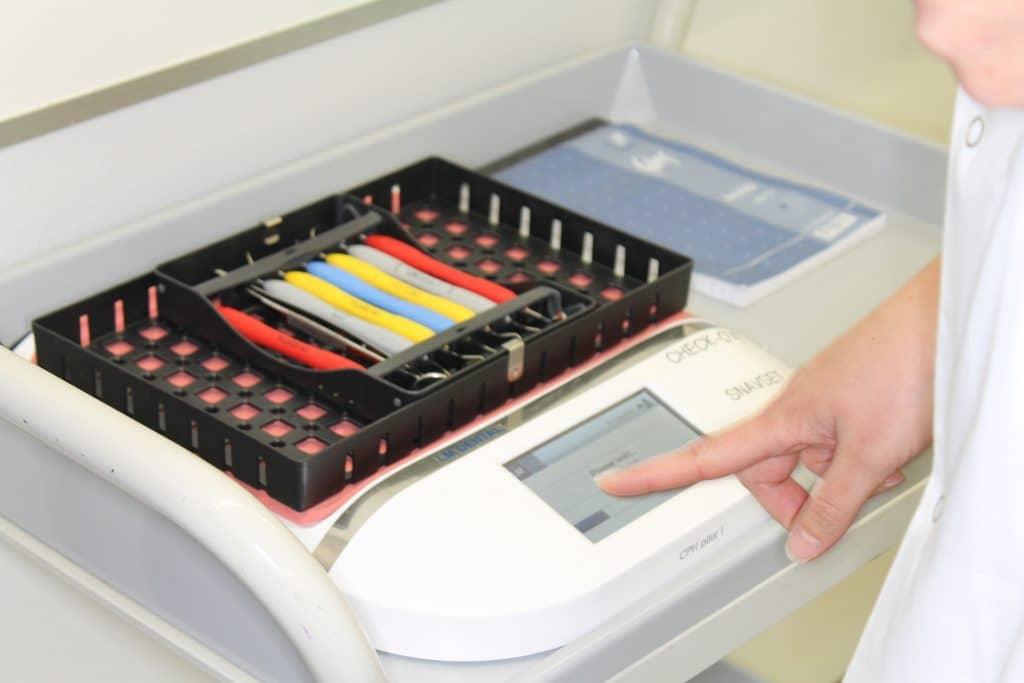The School of Oral Health Care at the University of Copenhagen (UCPH) has used LM DTS™ together with the RFID tagged LM-ErgoSense instruments for a couple of years already. The system has helped the clinic to make continuous improvements in the daily operations and long-term planning for increased patient safety. With the system school’s staff has greater control over the infection control status and stock levels of all instruments. “The LM DTS™ ensures that we always have full control over
the hygiene status of our instruments. We can also precisely document which of them students have been using and on which patients, as well as when they have been sterilized”, says Bo Danielsen, Head of the School of Oral Health Care at the UCPH at GS1 Healthcare Reference Book.
“The LM DTS™ ensures that we always have full control over the hygiene status of our instruments. We can also precisely document which of them students have been using and on which patients, as well as when they have been sterilized”
Head of School Bo Danielsen (D.D.S., MBA)
In autumn 2010 Bo Danielsen, Head of the School of Oral Health at the UCPH was reviewing the school’s budget for the following year and felt a bit uneasy. Danielssen wanted his staff to spend their time teaching students – on value-added activities rather than spending time in the sterilisation room and creating inventory reports and budget estimates.

The school didn’t know exactly how much budget was needed for new hand
instruments. In past years need was based on intuition. “I felt we needed information about the utilisation of instruments and their turnover to make fact-based decisions,” explains Danielsen.
Danielsen also realised that misplaced instruments represented a wasteful, hidden cost. The staff and students had to go from one operating room to another to get an instrument while those were not in the right place, at the right time. In summary, the cost per patient and per student were inflated due to time wasted and inefficient processes.
“We didn’t know exactly how big the impact of these inefficiences had on costs and how much we could benefit by optimizing the processes”, says Danielsen. Year 2018 decision to take action was made.
From vision to reality
By collaborating LM-Dental Danielsen’s vision was to come to reality. They
equipped their instruments with tiny, autoclavable RFID tags and placed wireless LM DTS™ RFID readers at the point of delivery and additional readears for example in reprocessing and in storage rooms.
Today, thousands of instrument-specific events are logged each month. When Danielssen now sits on computer, he logs into the cloud-based server that receives all the information from the readers scanning and collecting information across the clinic. “On my screen, I can see where each
instrument is located and whether it is ready for clinical use. The complete history of the specific instrument is documented,” says Danielsen.
Anyone from Danielsen’s team can view data from the perspective of his/her role. For example when budgeting you are getting related statistical reports and person responsible for logistics can run inventory reports and monitor daily stock levels.
Another benefit is that teachers can ensure that students return all instruments given to them. Also the use of instruments by student in a clinical simulation can be tracked for timely feedback.
Infection control and patient safety are top priorities in Denmark. With the traceability system, a layer of automatic safety checks to avoid human error is added without any administrative burden on the maintenance and clinical staff.
“With the new traceability system, we have the needed data to improve our daily operations, support education, improve long-term planning and budgeting, and obtain big data that can be used for analysis and research purposes,” concludes Danielsen.

About the school of Oral Health Care at the University of Copenhagen
The School of Oral Health Care at the University of Copenhagen (UCPH) is the largest school in Denmark, educating dental chairside assistants and dental hygienists. The school is co-located with the dental school in the Panum Institute, housing Denmark’s largest clinic with 230 dental units. More than 400 people related to School of Oral Health Care attend the Panum Institute daily. Furthermore, between 100 and 300 patients are treated in the clinics every day. The School of Oral Health Care closely collaborates with other similar institutions in Denmark, as well as abroad.